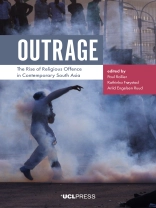Whether spurred by religious images or academic history books, hardly a day goes by in South Asia without an incident or court case occurring as a result of hurt religious feelings. The sharp rise in blasphemy accusations over the past few decades calls for an investigation into why offence politics has become so pronounced, and why it is observable across religious and political differences.
Outrage: The Rise of Political Offence in Contemporary South Asia offers an interdisciplinary study of this growing trend. Bringing together researchers in Anthropology, Religious Studies, Languages, South Asia Studies and History, all with rich experience in the variegated ways in which religion and politics intersect in this region, the volume presents a fine-grained analysis that navigates and unpacks the religious sensitivities and political concerns under discussion.
Each chapter focuses on a recent case or context of alleged blasphemy or desecration in India, Pakistan, Bangladesh and Myanmar, collectively exploring common denominators across national and religious differences. Among the common features are the rapid introduction of social media and smartphones, the possible political gains of initiating blasphemy accusations, and the growing self-assertion of marginal communities. These features are turning South Asia into a veritable flash point for offence controversies in the world today, and will be of interest to researchers exploring the intersection of religion and politics in South Asia and beyond.
Praise for Outrage
‘An important reading to analyze the religious offense which ultimately appears to constitute another dynamic of the politicization of the religious.’
Revue des mondes musulmans et de la Méditerranée
‘… This book does a fine job of opening up such questions for reflection and further research [and] succeeds in breaking stereotypes that float around in popular culture but go unquestioned.’
Hindustan Times
‘…the authors should be thanked for shedding light on an important phenomenon and contributing to a book worth reading.’DIN – Tidsskrift for religion og kultur (translated from Norwegian)
Cuprins
1. Introduction: researching the rise of religious offence in South Asia
Paul Rollier, Kathinka Frøystad, Arild Engelsen Ruud
2. ‘We’re all blasphemers’: the life of religious offence in Pakistan
Paul Rollier
3. The rise of religious offence in transitional Myanmar
Iselin Frydenlund
4. Religious outrage as spectacle: the successful protests against a blasphemous minister
Arild Engelsen Ruud
5. Affective digital images: Shiva in the Kaaba and the smartphone revolution
Kathinka Frøystad
6. ‘Durga did not kill Mahishasur’: Hindus, Adivasis, and Hindutva
Moumita Sen
7. The languages of truth: Saints, judges and the fraudulent in a Pakistani court
Asad Ali Ahmed
8. Blasphemy and the appropriation of vigilante justice in ‘hagiohistoric’ writing in Pakistan.
Jürgen Schaflechner
9. Afterword: on the efficacy of ‘blasphemy’
Ute Hüsken
Despre autor
Arild Engelsen Ruud is Professor of South Asia Studies at the University of Oslo. He works mainly on issues of political culture in South Asia, in particular Bangladesh and West Bengal.












